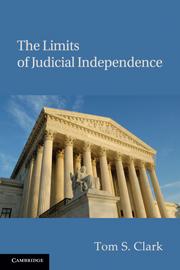Book contents
- Frontmatter
- Contents
- List of Tables
- List of Figures
- Acknowledgments
- 1 Introduction
- 2 A Political History of Court-Curbing
- 3 Conditional Self-Restraint
- 4 Court-Curbing and the Electoral Connection
- 5 Public Support and Judicial Review
- 6 Ideological Implications of Court-Curbing
- 7 The Limits of Judicial Independence
- Appendix A Elite Interview Methodology
- Appendix B Court-Curbing Bills, 1877–2008
- Bibliography
- Index
Appendix A - Elite Interview Methodology
Published online by Cambridge University Press: 05 August 2012
- Frontmatter
- Contents
- List of Tables
- List of Figures
- Acknowledgments
- 1 Introduction
- 2 A Political History of Court-Curbing
- 3 Conditional Self-Restraint
- 4 Court-Curbing and the Electoral Connection
- 5 Public Support and Judicial Review
- 6 Ideological Implications of Court-Curbing
- 7 The Limits of Judicial Independence
- Appendix A Elite Interview Methodology
- Appendix B Court-Curbing Bills, 1877–2008
- Bibliography
- Index
Summary
This research has benefited greatly from interviews I have had with Supreme Court justices, former law clerks, members of Congress, congressional staff, and interest group activists. Access to these elites is not easily granted, and when it is gained, a heavy responsibility lies with the researcher to promote a high degree of professionalism, as he represents the academic community to these individuals. In order to maintain a high level of professionalism, to protect the interests of my interview subjects, and to ensure that they may continue to be willing to speak with members of the academic community in the future, I have adopted a set of conventions that guide the use of interview evidence in this book. In this appendix, I describe the interview process – gaining access, conducting interviews, and following up from interviews – as well as the conventions I have adopted for the use of these interviews in my research.
METHOD
The method of conducting interviews is an art, not a science. Interview methodology involves gaining access, preparing for and conducting interviews, and post-interview follow-up.
Gaining Access
Different types of individuals vary in how they may be best contacted and how willing they are to grant access for an interview. Supreme Court justices, for example, have widely available contact information, though the only practical way to contact them is through the mail. These individuals, however, generally do not grant access to academics or the public.
- Type
- Chapter
- Information
- The Limits of Judicial Independence , pp. 271 - 275Publisher: Cambridge University PressPrint publication year: 2010

